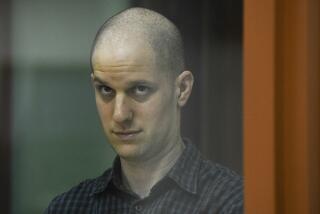Russian Tycoon Loses Bid for Bail
- Share via
MOSCOW — Looking drawn but determined on a courtroom video monitor, Yukos Oil tycoon Mikhail Khodorkovsky lost his bid for bail Tuesday when a panel of judges sided with prosecutors who argued that the billionaire could flee prosecution on tax evasion and fraud charges if freed from jail.
Participating in his first public appearance since his arrest Oct. 25, Khodorkovsky sat at a table in a small cell, writing quietly before the hearing began, then answering the judge’s questions firmly but quietly.
“Are you Mikhail Khodorkovsky?” asked the lead judge, Marina Selyena.
“Yes,” he replied.
“Were you born on the 26th of June, 1963?”
“Quite exactly.”
“What do you do?”
“Until recently, I was a member of the board of directors of the Yukos Oil Co.”
The case has been watched with intensity in Russia and around the world because Khodorkovsky is the nation’s richest man and his arrest has sparked a crisis in investor and political confidence in the administration of President Vladimir V. Putin.
Khodorkovsky has been a generous contributor to opposition political parties, and the timing of the arrest, a little more than a month before parliamentary elections, has raised questions about possible political motivation. The 40-year-old oil magnate has been suggested as a possible presidential candidate and, armed with an $8-billion fortune, openly defied Putin’s demand that Russia’s billionaire “oligarchs” stay out of politics.
Most of Tuesday’s hearing was held behind closed doors, after prosecutors argued that opening it to the public could allow the divulging of privileged information about the case.
“The representatives of Khodorkovsky’s organization could be present in the hall, and they could find out the names of witnesses, and influence them. The security of participants in the process is at stake,” argued Valery Lakhtin of the prosecutor-general’s office.
Yelena Lvova, one of Khodorkovsky’s lawyers, countered that a simple bail hearing would not be likely to divulge investigative secrets. “The security of the participants in the trial is not an issue,” she said.
At that point, the judges sided with the prosecutors and the audience was ushered out of the packed courtroom. Two hours later, defense lawyers said they had lost their bid to have Khodorkovsky released on bail.
The oil magnate, who stepped down as chief executive of Yukos last week but remains its biggest stockholder, has “no illusions” and is resigned to staying behind bars, said defense lawyer Anton Drel, at least until the current detention order expires Dec. 30. Drel also signaled his intent to appeal the decision to the Supreme Court, and possibly the European Court of Human Rights in Strasbourg, France.
Drel said the defense pointed out that Khodorkovsky is a low flight risk because he has turned in his passport, and his bank account shares in Yukos have been frozen.
Boris Nadezhdin, deputy leader of the Union of Right Forces party, which has received about 10% of its funding from Khodorkovsky, said several parliament deputies and other civic leaders had personally guaranteed the tycoon’s future court appearances if released from jail.
He complained that it was difficult to see Khodorkovsky on the TV monitor. “To be honest, the sight of Russia’s most powerful businessman sitting in a cage was not enjoyable,” he said.
Sergei Ivanyenko, deputy leader of the other opposition party Khodorkovsky has openly supported, Yabloko, was also glum.
“We came here to see if the judicial system is functioning properly, and we see it is in a deplorable state,” Ivanyenko said.
*
Times staff writer Sergei L. Loiko contributed to this report.
More to Read
Sign up for Essential California
The most important California stories and recommendations in your inbox every morning.
You may occasionally receive promotional content from the Los Angeles Times.










